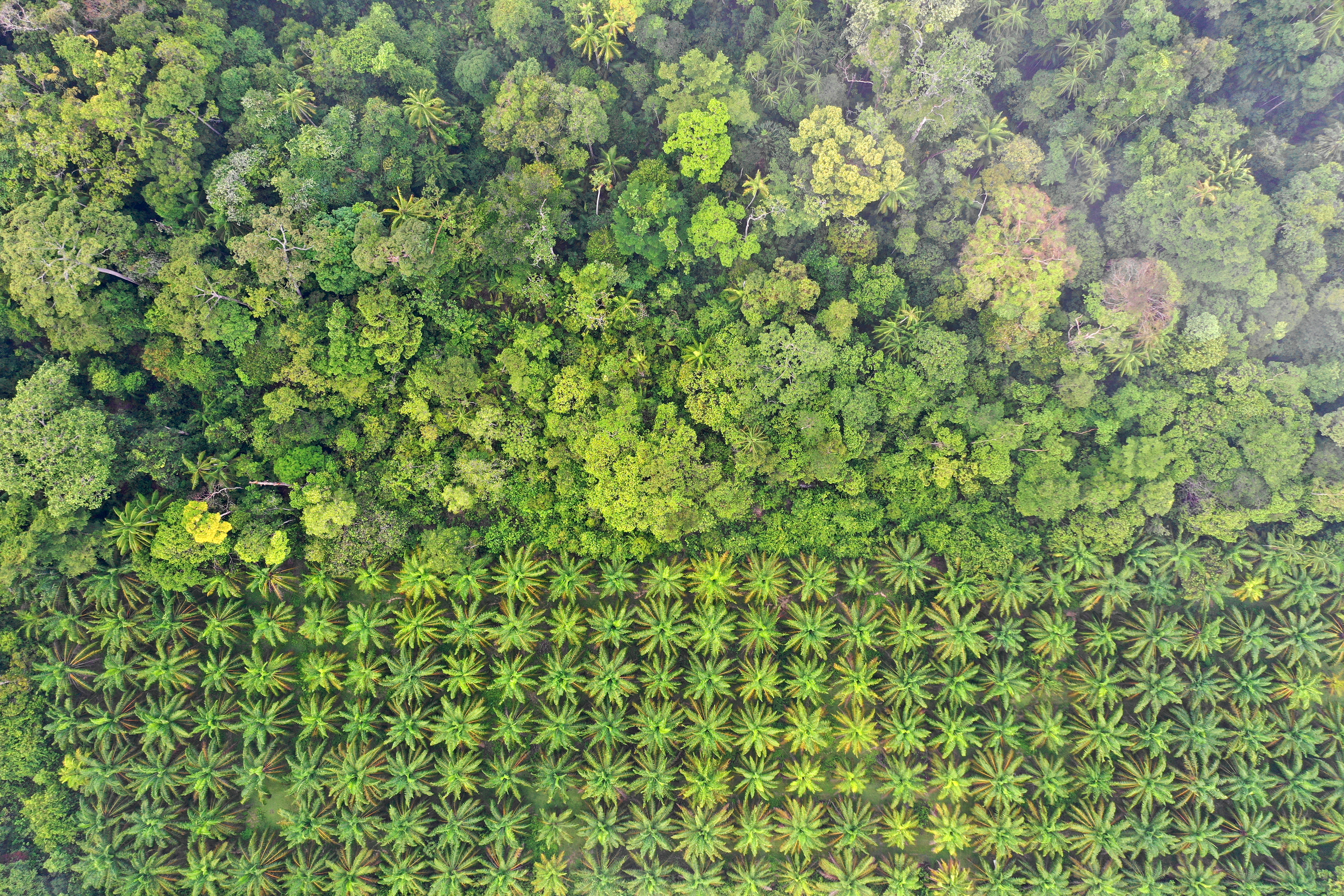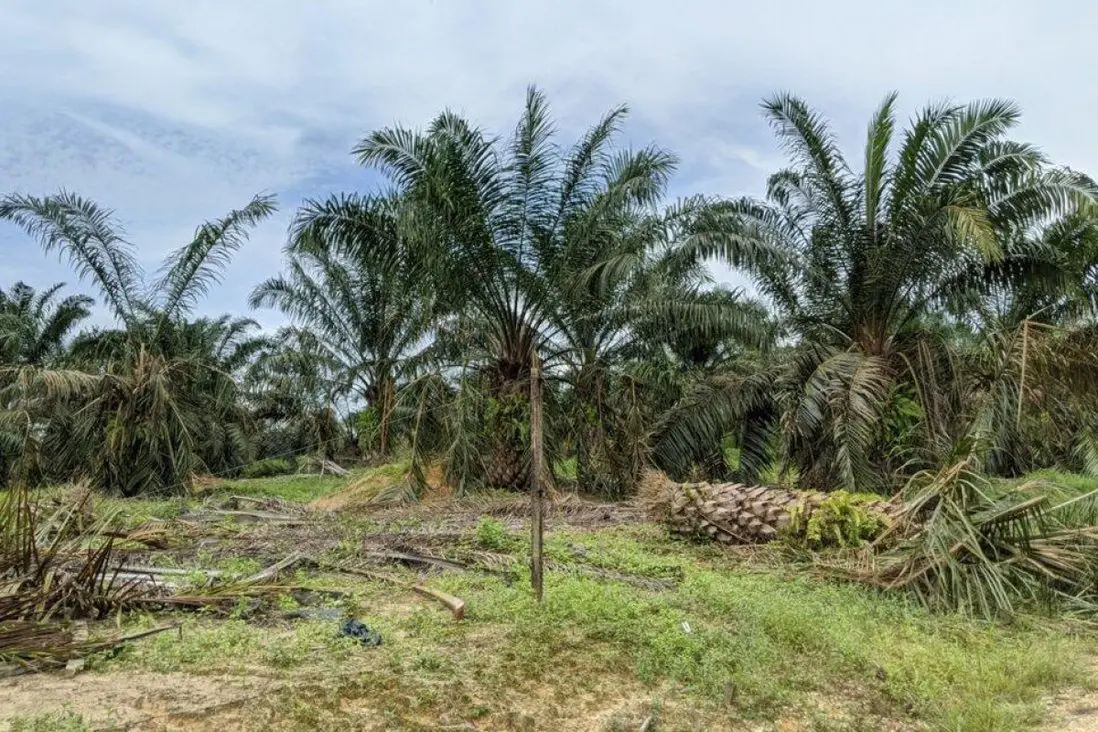
About five years ago, a herd of elephants showed up at Su Chun Fa’s estate in Malaysia and ate all the young oil palms in an eight-acre plot.
Su blamed himself. Elephants had long roamed the adjacent forests in Johor, but they had stayed away from the estates for some time, so he opted not to install electric fences.
“I was careless,” said the 75-year-old, who has lived in Peninsular Malaysia’s southernmost state of Johor for most of his life. He has since abandoned his plot near the town of Jemaluang and is now looking to sell it.

As a nonprofit journalism organization, we depend on your support to fund journalism covering underreported issues around the world. Donate any amount today to become a Pulitzer Center Champion and receive exclusive benefits!
Since 2016, residents in Jemaluang have faced a surge in conflicts with elephants, a trend that many blame on deforestation linked to an increase in oil palm plantations and gold mines.
Before and After
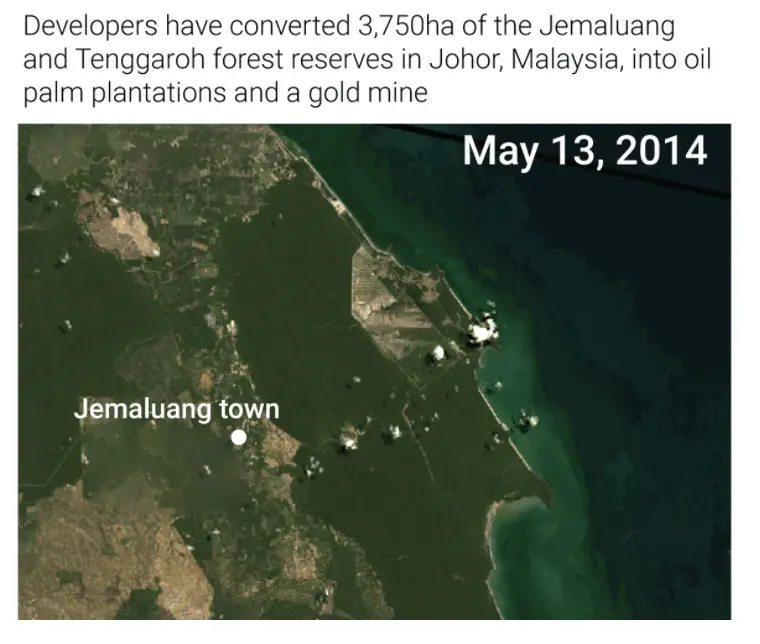
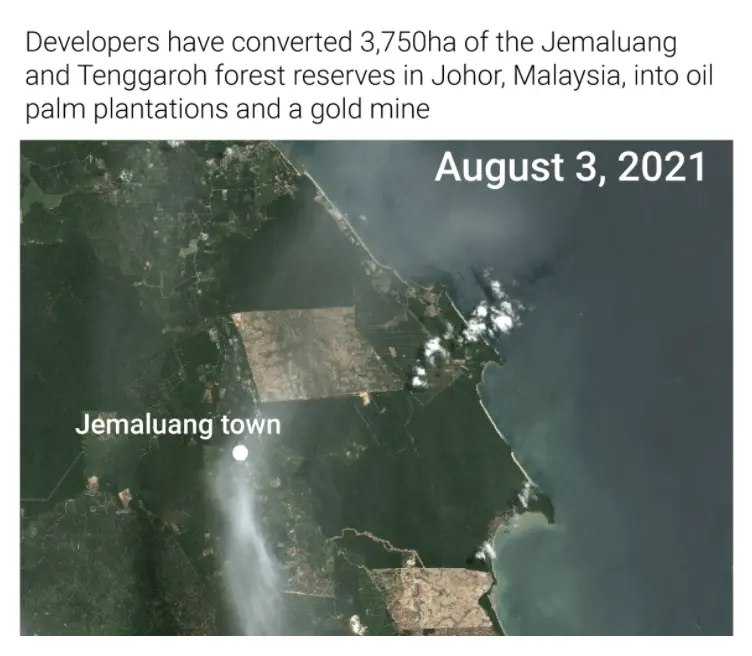
Before, the nearby forests — comprising the Jemaluang and Tenggaroh forest reserves — stretched for 25 kilometres along the coast. But land clearing removed 21 per cent of the forests. Upcoming projects will shrink them by at least another 24 per cent.
Wildlife scientist Wong Ee Phin, who conducts research to improve elephant conservation, said Johor residents were concerned over “human-elephant conflict” caused by forest loss.
“Elephants can move around a lot, so what happens to elephant habitats in one locality could have a wider impact on surrounding areas,” said Wong, whose team recently interviewed communities across Johor for the Management and Ecology of Malaysian Elephants research project at the University of Nottingham in Malaysia.
Anuj Jain, coordinator of Preventing Extinction and Bird Trade at Birdlife International, said the deforestation of an area with a rich biodiversity was alarming.
“Loss of lowland swamp and coastal forests at Jemaluang and Tenggaroh, at such a large scale, is hugely concerning,” he said. “So few of such forests are left in Malaysia, or for that matter, across much of Southeast Asia.”
Forests made up about 43 per cent of Peninsular Malaysia in 2019, according to official land-use figures. Of these, about 85 per cent was classified as forest reserves, where clear-felling – where trees in a specific area are uniformly cut down – is generally prohibited.
Developing forests, therefore, typically requires a reserve to be excised, which can only be approved by state governments.
In 2014, the Johor government excised 15,011 hectares out of the Jemaluang and Tenggaroh forest reserves. It was the largest forest reserve excision in Peninsular Malaysia in the last 20 years.
An undisclosed area of the land was privatised and now belongs to the ruler of Johor, Sultan Ibrahim Sultan Iskandar.
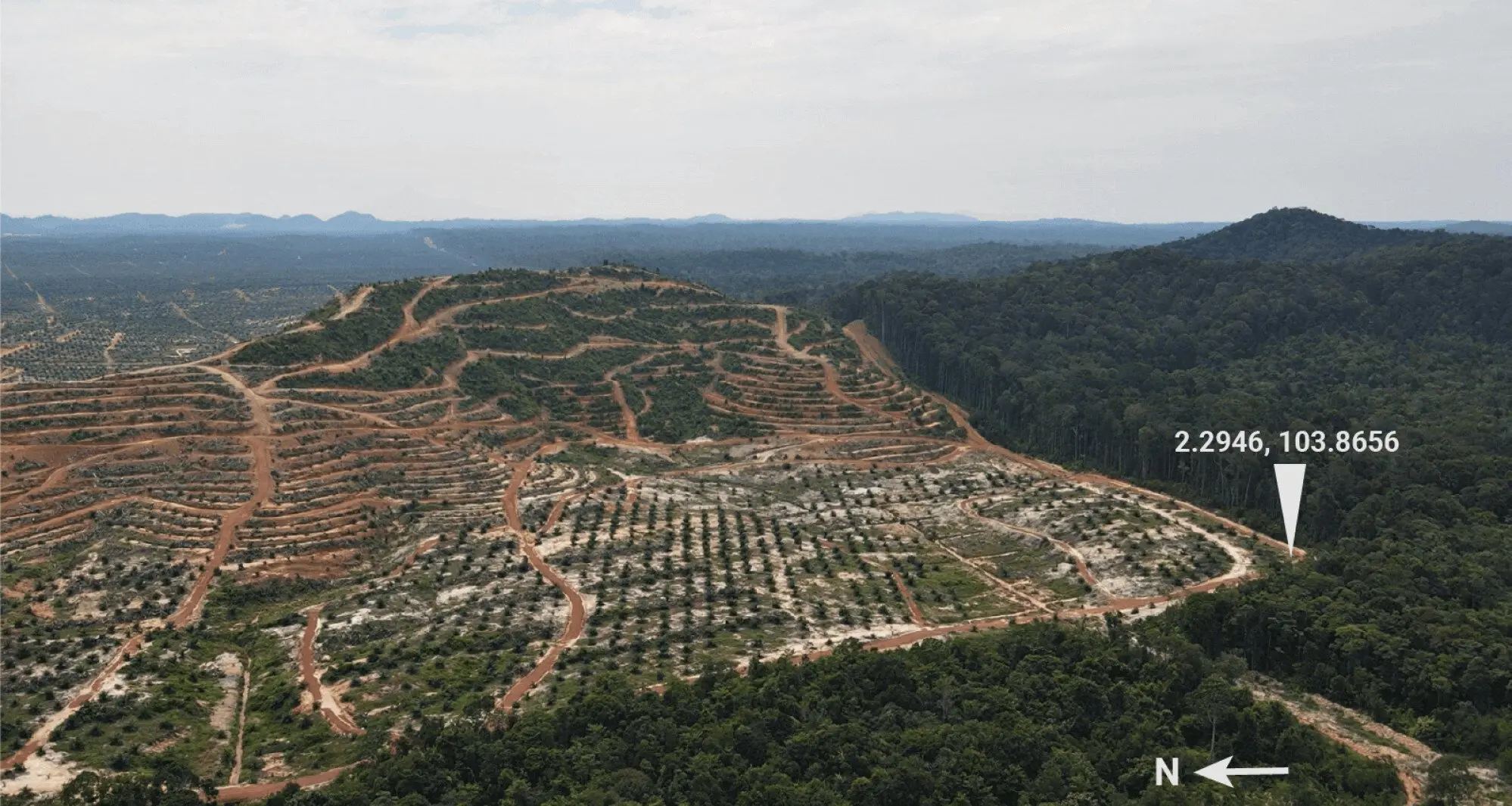
Developers worked quickly on the sultan’s portion of the forests. Since 2016, two private companies – AA Sawit Sdn Bhd and Nadi Mesra Sdn Bhd – have cleared about 3,750ha of the forests for oil-palm plantations. A gold mine occupies another 40ha.
AA Sawit is 51 per cent-owned by Sultan Ibrahim, and his son Tunku Ismail Sultan Ibrahim is one of the company’s two directors.
More forest loss seems imminent as Nadi Mesra is lining up new proposals for oil palm estates. Gold veins under the forests have also attracted Southern Alliance Ltd, a Singapore-listed firm, to partner with Sultan Ibrahim to carry out mining there.
Southern Alliance and Nadi Mesra are helmed by the same person — Malaysian mining tycoon Pek Kok Sam.
AA Sawit did not respond to interview requests. Nadi Mesra declined to comment, citing possible rebuke from “the landowner”.
The Johor sultan’s press office did not respond when contacted.
Environmental Costs
As lowland rainforests, Jemaluang and Tenggaroh have one of the highest levels of biodiversity in the tropics.
According to biological surveys in environmental impact assessment reports, the two forests are expected to contain about 200 species of birds, 60 species of mammals, and 30 species of reptiles and amphibians.
Dozens of these species are endangered and at the centre of intensive conservation efforts. These include the Malayan tiger, Sunda pangolin, Asian elephant, Malayan tapir and helmeted hornbill.
Jemaluang and Tenggaroh are particularly precious for having the Meranti telopok, an endangered tree found nowhere else in Peninsular Malaysia. Clusters of Meranti telopok were discovered in Jemaluang and Tenggaroh in the 2000s.
The chopping down of forests is forcing wildlife to venture into an unfamiliar and deadly world.
In 2017, seven tapirs were killed on the road in Johor, official figures show, more than the total number of incidents recorded in the five years before.
On the busy road running next to the Jemaluang forest, six complaints of human-elephant conflict were registered in 2018.
The same year, Johor’s Department of Wildlife and National Parks had commented on Nadi Mesra’s proposal for a plantation in Tenggaroh forest, saying it “experiences difficulty with increasing public complaints of wildlife conflict, especially those involving elephants”, and that it hoped the developer would put in place a wildlife management plan.
Experts warn more of such incidents would emerge if new developments sprout up.
“With more habitat loss and fragmentation, and with the emergence of new plantations, it raises concerns both on the human-wildlife conflict situation in agriculture areas and conservation of endangered species,” said Wong, the wildlife scientist.
Such deforestation also hurts Malaysia’s ability to tackle climate change and reduce carbon emissions by 45 per cent by 2030, she added.
Anuj, from Birdlife International, said new projects would be “a blow to our commitments to protect Malaysia’s natural heritage”.
Since 2010, the Malaysian federal government has been working to establish the Central Forest Spine — a contiguous forest landscape from northern to southern Peninsular Malaysia. Connecting forest patches would give animals a bigger, better habitat.
When the Central Forest Spine master plan was first unveiled, it featured Jemaluang forests as part of the southern forest complex. However, they were recently dropped from the plan, according to a list published on the website in September.
The Ministry of Energy and Natural Resources, the Forestry Department of Peninsular Malaysia, the Johor state forestry department, and the Wildlife and National Parks Department Peninsular Malaysia did not respond to queries.
The Malaysian Nature Society — an environmental NGO that had reviewed the environmental impact assessment report for Nadi Mesra’s latest project in Tenggaroh — also did not respond when contacted.

Amid the fears for the region’s flora and fauna, the local timber industry is thankful for the logs coming out of Jemaluang and Tenggaroh at a time of tapering supply.
In the nearby town of Kota Tinggi, two sawmill operators said AA Sawit and Nadi Mesra had in recent years become their main suppliers of logs.
“Business has been too challenging; we had to shrink our operations or else it’d be like having a large kitchen without rice to cook,” said one operator, who declined to be named.
But they do not expect future logging of the Jemaluang and Tenggaroh forests to improve business.
A secretary at Kemajuan Loong Seng Sdn Bhd, a logging and timber trading firm in Kota Tinggi, said it had been logging forest reserves in the area for about two decades with licences from the Johor state forestry department.
However, the approval for such licences has increasingly been scaled back. This change coincided with Sultan Ibrahim’s request since 2014 for logging quotas to end.
“Last year, we weren’t allowed to log,” said the secretary, who only wished to be known by her surname Teo. “It wasn’t just because of the pandemic. The government cancelled the licences. Even the [logging] quota that had been allotted was retracted. No compensation, just cancelled.”
This has largely left companies at the mercy of a dwindling pool of suppliers.
When Kemajuan Loong Seng’s sister sawmill ran out of logs, “we had no choice but to buy from [AA Sawit and Nadi Mesra]”.
“That’s why log prices have been increasing — because supply has reduced,” Teo said.
Forestry figures show that around Jemaluang, logging on private land has surpassed those on forest reserves. That is likely because the quota does not restrict logging on private land.
Unfettered by the quota, Nadi Mesra has benefited from harvesting the Tenggaroh forest. In the 12 months after it began logging in 2018, Nadi Mesra recorded 18.2 million ringgit (US$4.35 million) in sales and 3.4 million ringgit in profit before taxes in 2019, financial statements available through the Companies Commission of Malaysia showed.
It had been running losses the two years prior. An employee confirmed that the company had operations only in Jemaluang and Tenggaroh.
AA Sawit’s financial statements were not available through the Companies Commission of Malaysia.
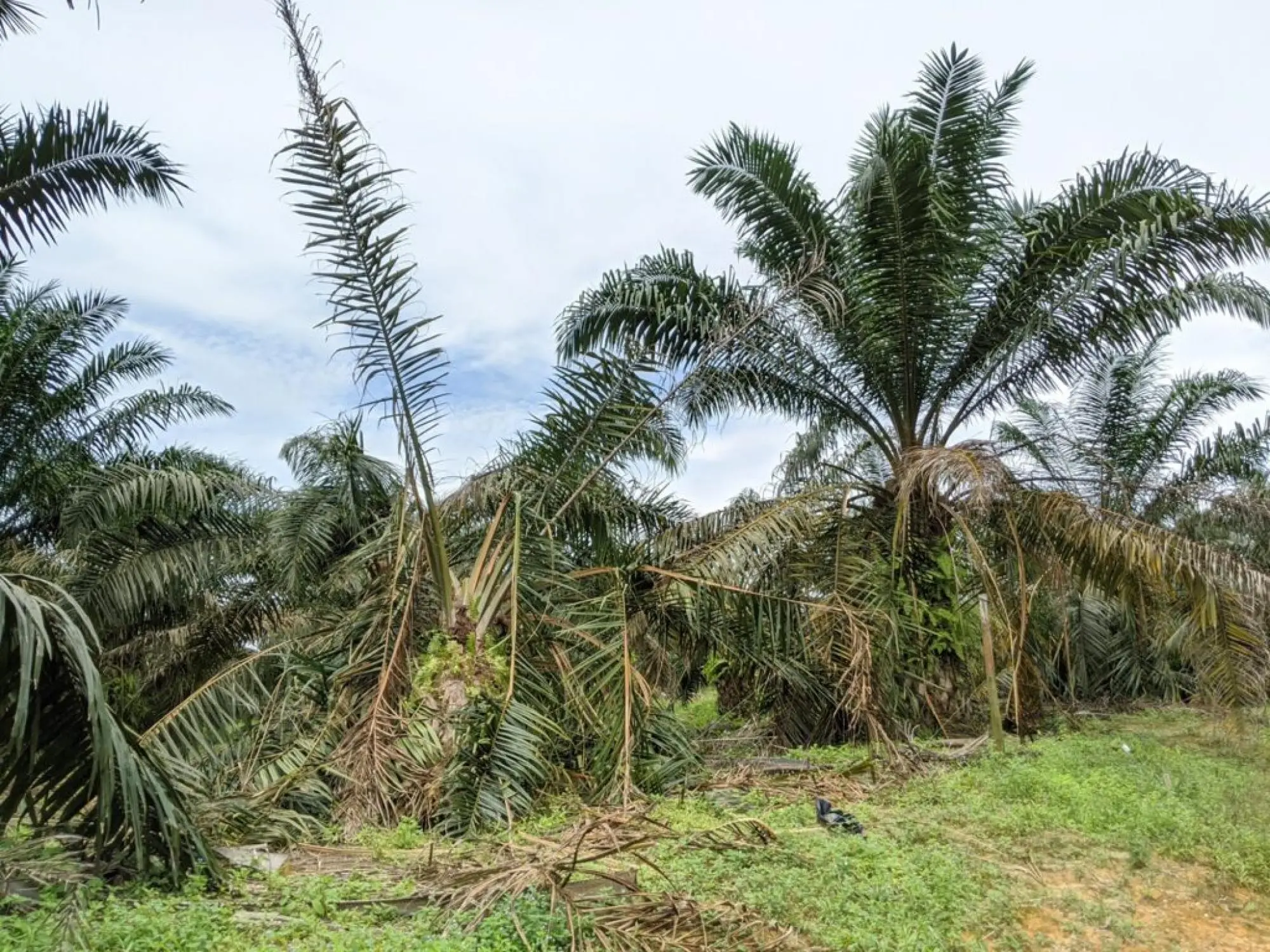
Ongoing Conversation
Meanwhile, a new 2,024ha palm oil plantation proposed by Nadi Mesra is in the spotlight. An environmental impact assessment report for its approval was submitted for government review in August.
Anuj, from Birdlife International, said converting natural forests with high biodiversity to palm oil plantations would be running “against the spirit of moving towards sustainably-sourced palm oil”.
Anuj and other environmentalists told This Week in Asia that the state government should gazette the forests as reserves again and protect them from development.
Even if the forests were not gazetted as reserves again, Anuj said they should be sustainably logged “in consultation with forestry experts so as to make sure these forests are still standing and can regenerate in years to come”.
While there have been reports of the Forest Research Institute Malaysia and Forestry Department of Peninsular Malaysia establishing areas of high conservation value in Tenggaroh to protect Meranti telopok, neither agency has elaborated on how such activities would proceed in the now-excised Jemaluang and Tenggaroh reserves.
As for the elephant conservation efforts, Wong said she was working with various partners, including government agencies and planters, to create corridors for the animals to move safely across their natural habitats in Johor.
“Fundamentally, we need stronger support to encourage preservation and conservation of our remaining forested areas,” she said.


